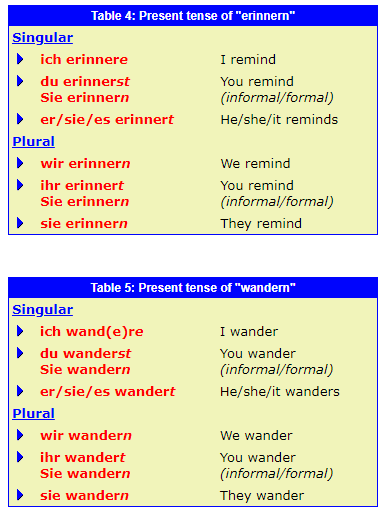German verbs whose infinitive stem ends in -ern also form their present tense by removing the -n of the stem and adding the normal endings. In spoken German, the -e of the stem is sometimes omitted in the first person singular - i.e. ich wand(e)re. In written German however, the -e of the stem is retained. Note also:
that the "wir" ending on such verbs is -n, not -en
that the formal "Sie" ending is also -n
that the third person plural ending is also -n, not -en

Verbs with a stem in ending in -ern include:
A-E: altern (to grow old), sich anbiedern (to court someone's favour), ändern (to change), ankern (to anchor), ärgern (to irritate), aufheitern (to brighten up), aufmuntern (to cheer up), äußern (to express), aussondern (to single out), auswandern (to emigrate), behindern (to impede), bemuttern (to mother), bereichern (to enrich), beteuern (to declare), bevölkern (to populate), bewundern (to admire), beziffern (to number; to estimate), blättern (to leaf through), chartern (to charter), dämmern (to dawn), dauern (to last, to endure), donnern (to thunder), durchstöbern (to rummage through), einbürgern (to naturalize), eitern (to fester), entziffern (to decipher), erinnern (to remind), sich erinnern (to remember), erlätern (to explain), erleichtern (to make easier), erneuern (to renew), erobern (to conquer), erörtern (to discuss), erschüttern (to shake severely), erweitern (to expand), erwidern (to respond)
F-M: feiern (to celebrate), feuern (to sack, to fire), filtern (to filter), flüstern (to whisper), folgern (to conclude), foltern (to torture), fordern (to demand), fördern (to support, to promote), füttern (to feed), gliedern (to structure), hämmern (to hammer), hamstern (to hoard; to forage), hapern (to be lacking), hindern (to impede), hungern (to starve), jammern (to whine, to yammer), kauern (to crouch; to cower), kentern (to capsize), kichern (to giggle), klammern (to peg, to staple), klappern (to clatter), klettern (to climb), knabbern (to nibble), knistern (to rustle), knittern (to crease), ködern (to lure; to entice), kontern (to counter), sich kümmern (to look after; to worry), lagern (to store), lästern (to be cruel about someone), lauern (to lurk, to lie in wait), liefern (to deliver), lindern (to alleviate), lockern (to loosen), martern (to torment), meckern (to grouse; to moan), meistern (to overcome), mildern (to alleviate), mindern (to diminish), mustern (to scrutinize)
N-S: opfern (to sacrifice), pflastern (to surface; to cobble), pilgern (to make a pilgrimage), plappern (to prattle), plaudern (to chat, to talk), plündern (to plunder), polstern (to upholster), pudern (to powder), räuchern (to smoke), sich räuspern (to clear one's throat), rudern (to row), säbern (to clean), scheitern (to fail), schildern (to depict), schimmern (to shimmer), schlendern (to stroll, to amble), schleudern (to hurl, to sling), schmälern (to diminish, to reduce), schnuppern (to sniff, to snuffle), sichern (to secure), speichern (to store), steigern (to increase), steuern (to navigate), stolpern (to stumble), stottern (to stutter)
T-Z: trauern (to mourn), untermauern (to underpin), verallgemeinern (to generalize), verändern (to change), verbessern (to improve), vergewissern (to make sure), vergrößern (to enlarge), verhindern (to prevent), verkleinern (to make smallert), verkörpern (to embody), verlängern (to extend), verringern (to reduce), verschlechtern (to make worse), verschleiern (to veil), verschlimmern (to make worse), versichern (to assure), versteigern (to auction), verweigern (to refuse), wandern (to wander), sich weigern (to refuse), wetteifern (to compete), wuchern (to proliferate), wundern (to surprise), zaubern (to do magic), zaudern (to hesitate), zertrümmern (to smash; to wreck), zittern (to tremble), zögern (to hesitate), zwinkern (to blink; to twinkle).





